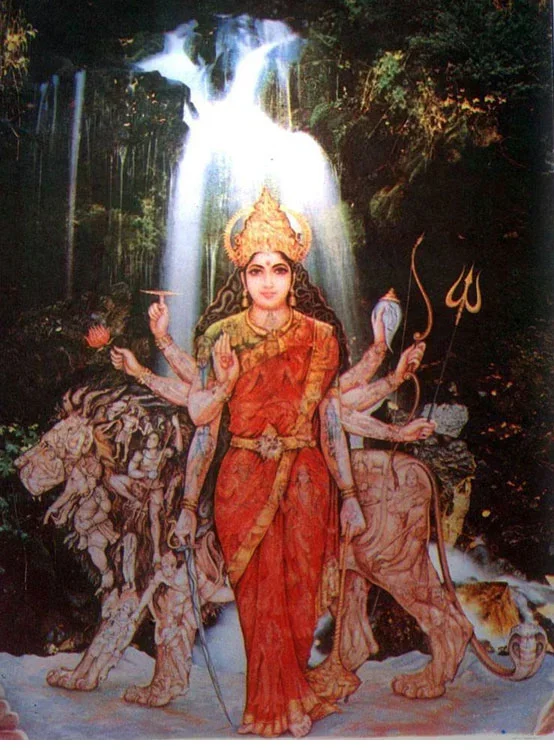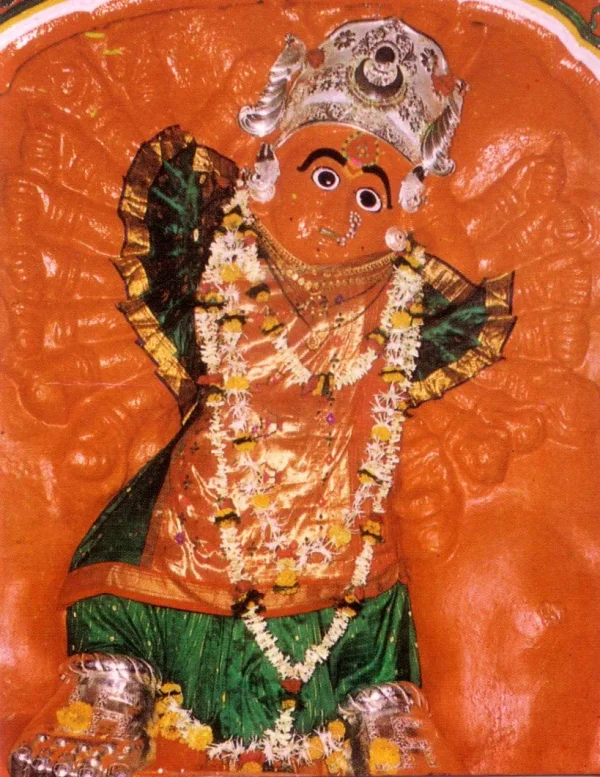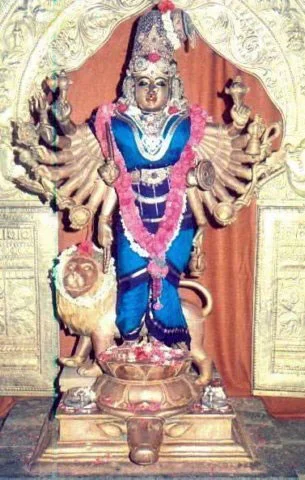Sharad Navarathri started today. I have just finished my Puja.
On this occasion , I thought I should post on Devi Mahatmyam. The following post was written 10 years back.
I will be posting on Devi Mahatmyam on all the nine days. Facets of the bible of the Sakthas.
Devi Mahatmyam is also called Durga Sapthasathi. It is called Sri Sri Chandi in Bengal. It is part of Markendeya purana.
MAA CHANDI is the central figure in the epic. Chandi or Chandika has been defined by the St. Petersburg dictionary as "the violent and impetuous one". Chandika is a derivative from the adjective Chandi- "fierce, passionate".This epithet is applied to the Goddess a total of twenty-nine times (maximum for any epithet) in the Devi Mahatmyam. Again this epithetis not used in the first Charithra dealing with Madhu Kaitabha.
In light of this primacy of this designation of the Goddess, it is striking that the word Chandika hasvirtually no earlier history in Sanskrit. Neither the Vedas nor the epics Mahabharata and Ramayana refer to MAA by this name.
In all the Devi Mahaatmyam books the mantra "Nava Avarna Mantra" is given and the procedure for reciting the Mantra. This mantra is also known as Navakshari or Chandi Navakshari as it contains nine syllables. We call it just The CHANDI. During my travels all over India, I have found that this is the best-known mantra. All over North India you get photographs, calendars and Yantras with this Mantra inscribed.
MAA CHANDI is worshipped all over India. But in most of the places there are three Murthis or Pindas representing MAHAA KALI, MAHAA LAKSHMI, and MAHAA SARASWATHI. Vaishno Devi temple in Jammu and Mahaa Lakshmi temple in Mumbai (Bombay) are representatives of this.
MAA CHANDI in my opinion was worshipped extensively long time back in Tamil Nadu. The first time I heard the epithet was when my mother called my rebellious sister Chandi. She also used epithets like Kaali and Bhadra Kali. The term Chandi is used in Tamil to mean "irrepressible ". This describes the quality of MAA CHANDI. So I think that MAA CHANDI must have been well known in Tamil Nadu for the term to come into the language. But now though there is no old temple for Chandi, people perform Chandi Homam at the drop of a hat. Most of the homams or havan are conducted by collecting donations from the public. There are variations like Dasa Chandi and Sahashra Chandi. The homam is done either with the recitation of Devi Mahatmyam and Navakshari mantra (more common) or Moola mantra homam (only recitation of Navakshari). A few Upasakas do it at home also.
Jai MAA !!!
On this occasion , I thought I should post on Devi Mahatmyam. The following post was written 10 years back.
I will be posting on Devi Mahatmyam on all the nine days. Facets of the bible of the Sakthas.
Devi Mahatmyam is also called Durga Sapthasathi. It is called Sri Sri Chandi in Bengal. It is part of Markendeya purana.
MAA CHANDI is the central figure in the epic. Chandi or Chandika has been defined by the St. Petersburg dictionary as "the violent and impetuous one". Chandika is a derivative from the adjective Chandi- "fierce, passionate".This epithet is applied to the Goddess a total of twenty-nine times (maximum for any epithet) in the Devi Mahatmyam. Again this epithetis not used in the first Charithra dealing with Madhu Kaitabha.
In light of this primacy of this designation of the Goddess, it is striking that the word Chandika hasvirtually no earlier history in Sanskrit. Neither the Vedas nor the epics Mahabharata and Ramayana refer to MAA by this name.
In all the Devi Mahaatmyam books the mantra "Nava Avarna Mantra" is given and the procedure for reciting the Mantra. This mantra is also known as Navakshari or Chandi Navakshari as it contains nine syllables. We call it just The CHANDI. During my travels all over India, I have found that this is the best-known mantra. All over North India you get photographs, calendars and Yantras with this Mantra inscribed.
MAA CHANDI is worshipped all over India. But in most of the places there are three Murthis or Pindas representing MAHAA KALI, MAHAA LAKSHMI, and MAHAA SARASWATHI. Vaishno Devi temple in Jammu and Mahaa Lakshmi temple in Mumbai (Bombay) are representatives of this.
MAA CHANDI in my opinion was worshipped extensively long time back in Tamil Nadu. The first time I heard the epithet was when my mother called my rebellious sister Chandi. She also used epithets like Kaali and Bhadra Kali. The term Chandi is used in Tamil to mean "irrepressible ". This describes the quality of MAA CHANDI. So I think that MAA CHANDI must have been well known in Tamil Nadu for the term to come into the language. But now though there is no old temple for Chandi, people perform Chandi Homam at the drop of a hat. Most of the homams or havan are conducted by collecting donations from the public. There are variations like Dasa Chandi and Sahashra Chandi. The homam is done either with the recitation of Devi Mahatmyam and Navakshari mantra (more common) or Moola mantra homam (only recitation of Navakshari). A few Upasakas do it at home also.
Jai MAA !!!



